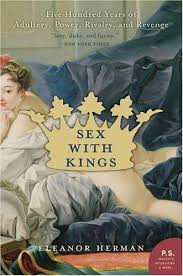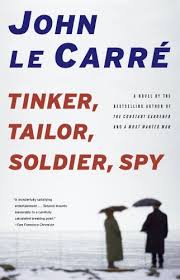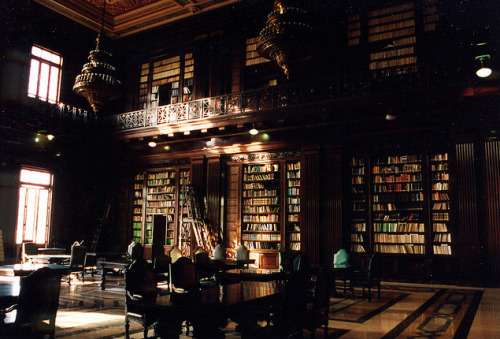By Eleanor Herman

I've been slowly making my way through Sex with Kings for the past few months, since it's the type of book you can easily pick up and come back to a few days/weeks later.
for the past few months, since it's the type of book you can easily pick up and come back to a few days/weeks later.
While the writing is light and frothy, it still covers a lot of ground, detailing the wide array of royal mistresses that have populated monarch's beds for centuries. Some are serious loves, with relationships spanning decades, while most are temporary placeholders until the next beauty comes along to take her place. One thing is clear, being a royal mistress was hard work, and those lucky few who found themselves on the receiving end of a king's affections had to work non-stop to hold onto their place of honor.
Overall a fun, interesting read. My only warning, Herman doesn't cover her subjects chronologically, so it's easy to get mixed up with the numerous names and dates she throws at you.
By John Le Carré

"Treason is very much a matter of habit." -George Smiley
Sometime last year I read that the British writer John Le Carré (the pen name of David Cornwell) was considered to be one of the greatest spy novelists of all time. I've always loved mystery novels, but the spy genre tends to be a very different animal altogether. And while spy novels sound like fun, I had never really found a great book to reel me in. However, last summer I ended up reading the American-based The Romeo Flag by Carolyn Hougan and enjoyed the quiet, intellectual style her spies possessed.
by Carolyn Hougan and enjoyed the quiet, intellectual style her spies possessed.
Luckily, John Le Carré's novels seem to have a similar understated intensity to them. Browsing through Amazon I discovered that Tinker, Tailor, Solider, Spy is considered to be one of his best novels (along with The Spy Who Came in From the Cold
is considered to be one of his best novels (along with The Spy Who Came in From the Cold and A Perfect Spy
and A Perfect Spy ). (An interesting side note, the term "mole" was first used by Le Carré in this novel.)
). (An interesting side note, the term "mole" was first used by Le Carré in this novel.)
The novel takes place during the height of the Cold War and focuses on the recently fired George Smiley, who is asked to return to his British Intelligence stomping grounds to find a long-ago implanted Russian mole. The character of Smiley goes against the suave James Bond-type made famous by Ian Fleming. Instead, Smiley is short, overweight, with a beautiful wife who has left him. He is later described by one of his agents: "You thought, to look at him, that he couldn't cross the road alone, but you might as well have offered protection to a hedge hog."
The spywork laid out in Tinker, Tailor is not flashy, or even exciting. Instead, it involves pouring through paperwork and the ability to analyze vast networks of spies and their handlers. He also manages to convey the strangeness of the double agent's life, working his way up in an organization while slowly destroying it in such a way as not to attract attention. Le Carré has the gift of possessing sparse, yet descriptive prose, allowing his work to more than just another spy novel.
is not flashy, or even exciting. Instead, it involves pouring through paperwork and the ability to analyze vast networks of spies and their handlers. He also manages to convey the strangeness of the double agent's life, working his way up in an organization while slowly destroying it in such a way as not to attract attention. Le Carré has the gift of possessing sparse, yet descriptive prose, allowing his work to more than just another spy novel.
Le Carré's attention to the vast details present in British Intelligence also sets his novel apart; the relationships, office hierarchies and the constant watchfulness present in all its agents. The detailed focus isn't surprising since Le Carré spent the 1950s and 1960s working for M15 and M16 running agents and conducting interrogations. His intelligence career came to an end when he was betrayed by Kim Philby, a British double-agent who was part of the Cambridge Five. In the book's introduction, Le Carré indicates that he used Philby as a model for his KGB mole.
 Things are a little slow in the book reading department lately. I started Christine Falls
Things are a little slow in the book reading department lately. I started Christine Falls by Benjamin Black (aka. accomplished author John Banville) but just couldn't get through it, and I'm currently juggling a few books at once, attempting to settle on one to finish. Sometimes when I find I just can't force myself to really find a book I love, I usually just sit back and wait for a good one to fall into my lap.
by Benjamin Black (aka. accomplished author John Banville) but just couldn't get through it, and I'm currently juggling a few books at once, attempting to settle on one to finish. Sometimes when I find I just can't force myself to really find a book I love, I usually just sit back and wait for a good one to fall into my lap.
Until then, I decided to write a post on one of my favorite writers of historical fiction, Sharon Kay Penman. I first read Here Be Dragons in high school and instantly became addicted to her novels, which usually take place during the Middle Ages in England, Wales and France.
in high school and instantly became addicted to her novels, which usually take place during the Middle Ages in England, Wales and France.
Historical fiction is a tricky genre since the author is confined by the major plot points, but must still have the talent to bring characters alive and make them understandable to the reader. What makes Penman's writing even more impressive is her preferred time frame of the Middle Ages. In her author notes she usually acknowledges there is very little in the way of first-hand information on the rulers of the time (from what they looked like to the state of their marriages) so a writer of historical fiction must carefully pick and choose what archives and historians to turn to for information. Furthermore, I find Penman manages to convey the attitudes, beliefs and world views most people had during those times.
She also manages to make the customs and cultures of the various geographic locations come alive. Here Be Dragons (as well as the following novels Falls the Shadow and The Reckoning
and The Reckoning ) taught me more about Wales than I ever knew was possible. Did you know that in Wales during the Middle Ages couples could be granted divorces if they realized they had made a mistake? Or that a wife was permitted to divorce her husband if he was physically abusive towards her? Or that illegitimate children had the same rights and privileges as children born in wedlock? In fact, the culture and tradition of Wales almost serves the purpose of another character her books.
) taught me more about Wales than I ever knew was possible. Did you know that in Wales during the Middle Ages couples could be granted divorces if they realized they had made a mistake? Or that a wife was permitted to divorce her husband if he was physically abusive towards her? Or that illegitimate children had the same rights and privileges as children born in wedlock? In fact, the culture and tradition of Wales almost serves the purpose of another character her books.
Penman also has a fantastic website, as well as a blog, where she updates her readers in on her writing process and the progress of her books (she is currently finishing up one book on Richard the Lionheart). She also shares her favorite authors and offers suggestions for further reading.
Below is a listing of all the Penman books I read in chronological order, as well as links for some of her more recent mystery novels set in the Middle Ages.
When Christ and His Saints Slept (Volume I of Henry and Eleanor Trilogy)- (1101-1154) Empress Maude, the daughter of King Henry I of England, battles for her throne against her cousin Stephen, the son of William I. England is plunged into a 20 year civil war so destructive historians said it was a time when "Christ and his saints slept." While Elizabeth I was the first female monarch of England it was supposed to have been the beautiful and strong-willed Maude, who's son Henry would go on to become one of England's greatest kings.
(Volume I of Henry and Eleanor Trilogy)- (1101-1154) Empress Maude, the daughter of King Henry I of England, battles for her throne against her cousin Stephen, the son of William I. England is plunged into a 20 year civil war so destructive historians said it was a time when "Christ and his saints slept." While Elizabeth I was the first female monarch of England it was supposed to have been the beautiful and strong-willed Maude, who's son Henry would go on to become one of England's greatest kings.
Time and Chance (Volume II of the Henry and Eleanor Trilogy)- (1156-1171) The second in the trilogy, the novel begins after Henry II has inherited the crown and married the beautiful and powerful Eleanor of Aquitaine (nearly ten years his senior). The story also focuses on Henry's chancellor and friend Thomas Beckett, who he appoints as the powerful archbishop of Canterbury. Beckett soon becomes a defender of the church against his one-time friend and their contentious relationship results in Beckett's murder and his later sainthood.
(Volume II of the Henry and Eleanor Trilogy)- (1156-1171) The second in the trilogy, the novel begins after Henry II has inherited the crown and married the beautiful and powerful Eleanor of Aquitaine (nearly ten years his senior). The story also focuses on Henry's chancellor and friend Thomas Beckett, who he appoints as the powerful archbishop of Canterbury. Beckett soon becomes a defender of the church against his one-time friend and their contentious relationship results in Beckett's murder and his later sainthood.
Devil's Brood (Volume III of the Henry and Eleanor Trilogy)- (1171-1186) The final novel in the trilogy focuses on the aftermath of Thomas Beckett's murder and the tumultuous relationship of Henry II and his queen Eleanor of Aquitaine. Their four sons chafe under their father's strict nature, and along with Eleanor's urging, they launch into a ten-year battle to overthrow their father. Penman accounts Eleanor's attempt to escape her husband by dressing as a man, but she would be caught and imprisoned for 16 years.
(Volume III of the Henry and Eleanor Trilogy)- (1171-1186) The final novel in the trilogy focuses on the aftermath of Thomas Beckett's murder and the tumultuous relationship of Henry II and his queen Eleanor of Aquitaine. Their four sons chafe under their father's strict nature, and along with Eleanor's urging, they launch into a ten-year battle to overthrow their father. Penman accounts Eleanor's attempt to escape her husband by dressing as a man, but she would be caught and imprisoned for 16 years.
Here Be Dragons (Volume I of Welsh Trilogy)- (1183-1232) Eleanor and Henry's youngest son is now King John and he secures a truce with divided Wales by marrying his out-of-wedlock daughter Joanna to Llewelyn, Prince of North Wales. The novel follows their marriage as well as John's attempts to subdue Wales under his reign.
(Volume I of Welsh Trilogy)- (1183-1232) Eleanor and Henry's youngest son is now King John and he secures a truce with divided Wales by marrying his out-of-wedlock daughter Joanna to Llewelyn, Prince of North Wales. The novel follows their marriage as well as John's attempts to subdue Wales under his reign.
Falls the Shadow (Volume II of Welsh Trilogy)- (1231-1267) This novel picks up with the incompetent reign of King Henry III and his bitter feud with his brother-in-law Frenchman Simon de Montfort. Born to a poor family, de Montfort rises to powerful heights marrying the king's sister against his will, and then by forcing him to sign the revolutionary Oxford Provisions, limiting the kings' power and assuring the rights of his English subjects. Henry's intelligent and ruthless son Edward eventually prevails at the battle of Evesham, changing the course of English and Welsh history forever.
(Volume II of Welsh Trilogy)- (1231-1267) This novel picks up with the incompetent reign of King Henry III and his bitter feud with his brother-in-law Frenchman Simon de Montfort. Born to a poor family, de Montfort rises to powerful heights marrying the king's sister against his will, and then by forcing him to sign the revolutionary Oxford Provisions, limiting the kings' power and assuring the rights of his English subjects. Henry's intelligent and ruthless son Edward eventually prevails at the battle of Evesham, changing the course of English and Welsh history forever.
The Reckoning (Volume III of Welsh Trilogy)- (1271-1283) Edward I is now king of England and Wales, and the novel focuses on the Welsh uprising and the Welsh king Llewelyn ap Gruffydd. Engaged to Simon de Montfort's daughter Ellen, Llewelyn must deal with Edward's increasing power over Wales and the kidnapping of Ellen by pirates at Edward's behest. The saddest of all the Welsh trilogys, since the Welsh rebellion would never survive Edward I's reign.
(Volume III of Welsh Trilogy)- (1271-1283) Edward I is now king of England and Wales, and the novel focuses on the Welsh uprising and the Welsh king Llewelyn ap Gruffydd. Engaged to Simon de Montfort's daughter Ellen, Llewelyn must deal with Edward's increasing power over Wales and the kidnapping of Ellen by pirates at Edward's behest. The saddest of all the Welsh trilogys, since the Welsh rebellion would never survive Edward I's reign.
The Sunne in Splendor : A Novel of Richard III
: A Novel of Richard III - (1459-1492) Penman tackles the controversial Henry III and his rise to power. She manages to make the much maligned King sympathetic, but not without his serious faults.
- (1459-1492) Penman tackles the controversial Henry III and his rise to power. She manages to make the much maligned King sympathetic, but not without his serious faults.
Justin de Quincy Medieval Mysteries
The Queen's Man Cruel as the Grave
Cruel as the Grave Dragon's Lair
Dragon's Lair Prince of Darkness
Prince of Darkness



